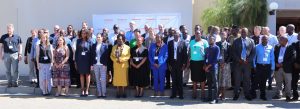
SASSCAL’ s German Alternate Board Member, Dr Svenja Kruse and Executive Director Dr Jane Olwoch joined by participants at the SASSCAL 2.0 Research Programme launch
Participants gathered at the SASSCAL 2.0 Kick-off meeting had a chance to glance at the future projected temperatures in SADC. German Ambassador to Namibia, H.E Herbert Beck has reminded the world to take heed of warnings of the worsening effects of climate change. The ambassador was speaking in Windhoek recently during the launch of the SASSCAL 2.0 Research Programme.
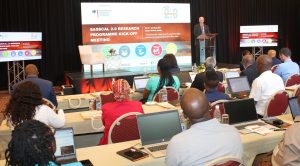
German Ambassador to Namibia, H.E. Herbert Beck addressing the participants during the official event of the launch
The Intergovernmental Panel on Climate Change recently reminded us that the world was heading to 2.8 degrees Celsius of global warming instead of 2 degrees Celsius. “So, I am a bit worried but also, I believe in science and solutions”, he said. The launch, which happened over two days from 22-23 March 2023 was held under the theme; “Towards impactful research outcomes for climate adaptation and mitigation in the Southern Africa region”.
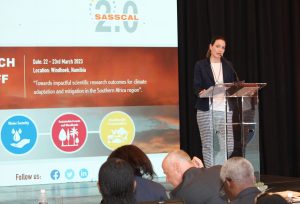
SASSCAL’s German Alternate Board Member, Dr Svenja Kruse speaking at the official opening of the launch programme
To this end, SASSCAL’ s German Alternate Board Member, Dr Svenja Kruse who also represented the BMBF at the occasion remarked that due to the importance attached to the development and implementation of the climate change adaption strategy, the BMBF, partner countries and five countries in Southern Africa initiated the establishment of SASSCAL more than 10 years ago. Dr Kruse expressed her excitement to see so many interested and involved partners as well as all implementers of the second phase research projects at the launch. BMBF is SASSCAL’s initial and main funder.
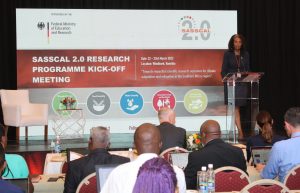
SASSCAL’s Executive Director Dr Jane Olwoch speaking at the launch
SASSCAL Executive Director, Dr Jane Olwoch applauded the audience from different parts of the world such as Germany, SADC and other countries for gathering in big numbers to highlight the importance of partnerships in dealing with climate change. “Today we also see strides that we have made and also the partnership we made especially with the BMBF,” she said. Dr Olwoch thanked the German Government through the BMBF for supporting SASSCAL since its establishment to date. “We celebrated 10 years last year in April and it is exciting that we are starting this year again with 10 million Euro funding from the German Federal Ministry of Education and Research for the SASSCAL 2.0 Research Programme,” she added.
Meanwhile, Principal investigator of one of the SASSCAL 2.0 projects and Director at the University of the Witwatersrand’s Global Change Institute, Prof. Francois Englebrecht, said the options for adaptation to climate change may be limited and lead to the existence of tipping points.
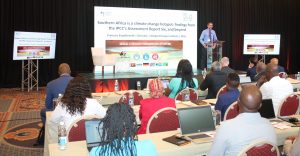
Principal Investigator of SASSCAL 2.0 TIPPEC Prof. Francois Englebrecht delivering his technical keynote address
This is considering that the Southern African region is already warm and water-stressed and due to climate change, the region is certain to become drastically warmer, and also likely drier. “Southern African climate and environmental scientists thus need to increase their efforts to anticipate climate change tipping points in the southern African region, and pursue adaptation solutions,” Prof Engelbrecht said. And in view that humans and their ecosystems may collapse due to climate change, adaptation solutions are urgently needed.
“Southern African climate and environmental scientists thus need to increase their efforts to anticipate climate change tipping points in the southern African region, and pursue adaptation solutions,” Prof Engelbrecht said. And in view that humans and their ecosystems may collapse due to climate change, adaptation solutions are urgently needed.
SASSCAL 2.0 is the organisation’s second phase of its research programme, which will be implemented over a period of five years and involves 13 projects namely SUSTAIN, FoSRECs, RIBS, ELNAC, TIPPEC, ANTELOPE, WIRE, FRAME, Climate Smart Crops, Properties Plants, ANGSOILS and VRPE. These projects are in line with SASSCAL’s five thematic areas of agriculture, water, biodiversity, climate and forestry. The research programme received funding of 10 million Euro from the German Federal Ministry of Education and Research.
The launch brought together over 100 participants including academic, research, and government institutions and other partner organisations working in the area of climate change in the five SASSCAL member states namely Namibia, Zambia, Angola, Botswana and South Africa and Germany.
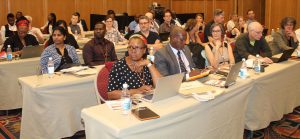
Participants seen at the launch of SASSCAL 2.0 Research Programme
At the launch, the principal investigators presented a road map of their 13 research projects.
Apart from the official opening event, various panel discussions, presentations on harmonization of methodologies, data access and storage as well as perspectives of project monitoring and evaluation also formed part of the programme. Also, learning activities on how the projects should compile technical, scientific and financial reports were offered to project members.
SASSCAL 2.0 aims to address the imminent challenges posed by climate change and to improve Southern Africa’s regional integration in scientific research. The portfolio was conceptualized to enhance internationally recognized research programmes, intensify continental and global engagement by developing and expanding international research collaboration, building sustainable multinational partnerships, and addressing global challenges through international development projects.
The Research Programme will enhance skills, build institutional and human capacity in scientific research and establish long-term collaboration that works towards a scientific understanding of climate change from a mitigation and adaptation perspective.
Research products and services shall be generated in the process.
SASSCAL 2.0 supports research that advances diversity and inclusivity that leads to an increased understanding of cultures and communities within the region and across Africa making it the kind of research that involves local people and intends to improve the quality of their lives. Its predecessor – SASSCAL 1.0 Research Programme was implemented between 2012 and 2018, during which it generated 88 research tasks and 230 peer-reviewed publications. It produced a number of graduates including 227 Bachelor’s and Master’s degrees, and 33 doctorates during its implementation phase.




